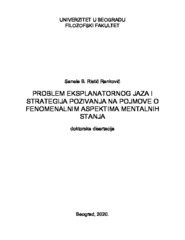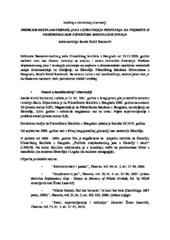Problem eksplanatornog jaza i strategija pozivanja na pojmove o fenomenalnim aspektima mentalnih stanja
The explanatory gap problem and the phenomenal concepts strategy
| dc.contributor.advisor | Lazović, Živan | |
| dc.contributor.other | Bogdanovski, Mašan | |
| dc.contributor.other | Milevski, Voin | |
| dc.creator | Ristić Ranković, Sanela | |
| dc.date.accessioned | 2021-05-07T12:48:29Z | |
| dc.date.available | 2021-05-07T12:48:29Z | |
| dc.date.issued | 2021-02-08 | |
| dc.identifier.uri | http://eteze.bg.ac.rs/application/showtheses?thesesId=8101 | |
| dc.identifier.uri | https://fedorabg.bg.ac.rs/fedora/get/o:23596/bdef:Content/download | |
| dc.identifier.uri | http://vbs.rs/scripts/cobiss?command=DISPLAY&base=70036&RID=37124361 | |
| dc.identifier.uri | https://nardus.mpn.gov.rs/handle/123456789/18287 | |
| dc.description.abstract | Naš osnovni cilj u ovoj disertaciji biće da prikažemo i analiziramo problem eksplanatornog jaza u filozofiji duha kako bismo utvrdili da li taj problem predstavlja nepremostivu teškoću za fizikalizam. Nastojaćemo da pomirimo postojanje eksplanatornog jaza sa fizikalističkim tumačenjem prirode svesti pomoću strategije koja polazi od suštinske razlike između pojmova o fenomenalnim aspektima mentalnih stanja (kvalitativnih pojmova) i fizikalnih pojmova. Osnovna pretpostavka od koje polazimo jeste da nam je za obnovu fizikalističkog rešenja problema svesti neophodna prihvatljiva analiza problema eksplanatornog jaza kao i suočavanje sa antifizikalističkim argumentima. Kritički ćemo analizirati i različite varijante shvatanja kvalitativnih pojmova. To je posebna vrsta pojmova kojom referiramo na fenomenalna svojstva sopstvenog iskustva. Njihovo distinktivno svojstvo je nepostojanje a priori veze sa ostalim pojmovima koje posedujemo. Služeći se fizikalnim pojmovima prilikom opisivanja neurofizioloških svojstava izostavljamo kvalitativna svojstva svesti, odnosno, kako izgleda neko svesno iskustvo iz perspektive onog ko doživljava iskustvo o kome je reč. Međutim, dok dualizam ovu tezu smatra osnovom antifizikalističkih argumenata, pokazaće se da je ona ne samo kompatibilna sa fizikalizmom, već je i fizikalistički odgovor na eksplanatorni jaz. U radu se zastupa stav da je moguće pokazati da kvalitativni i fizikalni pojmovi, uprkos logičkoj nezavisnosti, referiraju na iste entitete. Osim toga, ozbiljno se suočavamo sa dualističkim intuicijama koje opstaju i nakon svedočanstva u prilog psihofizičkom identitetu. Preispitaćemo najvažnije argumente protivnika pomenute strategije i pokušati da na njih odgovorimo. Cilj rada je da ponudi ubedljivo objašnjenje za davanje prednosti fizikalističkom tumačenju svesti | sr |
| dc.description.abstract | In this thesis our basic aim is to present and analyze the explanatory gap problem in philosophy of mind in order to answer the question: Is this the insurmountable problem for physicalism? We will try to reconcile the existence of the explanatory gap and physicalistic explanation of the nature of consciousness by appealing to the phenomenal concepts strategy. The main assumption is that an acceptable analysis of the explanatory gap problem, as well as confronting with the anti-physicalistic arguments, is necessary condition for renewal of the physicalistic solution to the problem of consciousness. In this dissertation, the author critically examines the various notions of phenomenal concepts. Those are the special kind of concepts which we use to refere to phenomenal properties of our own experience. Their distinctive feature is the nonexistence of a priori connection with other concepts we possess. By using the physical concepts in describing neurophysiological properties we leave out the phenomenal properties of consciousness, e.i. what it is like to have a conscious experience from the subjective point of view. However, since dualism regards this thesis as a basis of anti-physicalist arguments, it will turn out that not only it is compatible with physicalism, but it is also physicalistic response to the explanatory gap. The thesis supports the standpoint that it is possible that phenomenal and physical concepts refer to the same entities, despite their logical independence. In addition to that, we are facing dualist intuitions that prevail even after the evidence in favor of psychophysical identity. We will examine the most prominent arguments against the aforementioned strategy and try to argue them. The aim of the thesis is to offer convincing explanation for giving advantage to physicalistic interpretation of consciousness | en |
| dc.format | application/pdf | |
| dc.language | sr | |
| dc.publisher | Универзитет у Београду, Филозофски факултет | sr |
| dc.relation | info:eu-repo/grantAgreement/MESTD/MPN2006-2010/149010/RS// | |
| dc.rights | openAccess | en |
| dc.rights.uri | https://creativecommons.org/licenses/by-nc/4.0/ | |
| dc.source | Универзитет у Београду | sr |
| dc.subject | Eksplanatorni jaz | sr |
| dc.subject | Explanatory gap | en |
| dc.subject | fenomenalna svest | sr |
| dc.subject | kvalije | sr |
| dc.subject | kvalitativni pojmovi | sr |
| dc.subject | psihofizički iskazi identiteta | sr |
| dc.subject | fizikalizam | sr |
| dc.subject | dualističke intuicije | sr |
| dc.subject | naučno objašnjenje | sr |
| dc.subject | phenomenal consciousness | en |
| dc.subject | qualia | en |
| dc.subject | phenomenal concepts | en |
| dc.subject | psycho-physical identity statements | en |
| dc.subject | physicalism | en |
| dc.subject | dualist intuitions | en |
| dc.subject | scientific explanation | en |
| dc.title | Problem eksplanatornog jaza i strategija pozivanja na pojmove o fenomenalnim aspektima mentalnih stanja | sr |
| dc.title.alternative | The explanatory gap problem and the phenomenal concepts strategy | en |
| dc.type | PhD thesis | |
| dc.rights.license | BY-NC | |
| dcterms.abstract | Лазовић, Живан; Богдановски, Машан; Милевски, Воин; Ристић Ранковић, Санела; Проблем експланаторног јаза и стратегија позивања на појмове о феноменалним аспектима менталних стања; Проблем експланаторног јаза и стратегија позивања на појмове о феноменалним аспектима менталних стања; | |
| dc.identifier.fulltext | https://nardus.mpn.gov.rs/bitstream/id/71307/IzvestajKomisije28678.pdf | |
| dc.identifier.fulltext | https://nardus.mpn.gov.rs/bitstream/id/71306/Disertacija.pdf | |
| dc.identifier.rcub | https://hdl.handle.net/21.15107/rcub_nardus_18287 |



